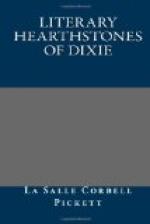Unlike most Southern poets, Father Ryan did not take his themes from Nature, and when her phenomena enters into his verse it is usually as a setting for the expression of some ethic or emotional sentiment. He has been called “the historian of a human soul,” and it was in the crises of life that his feeling claimed poetical expression. When he heard of Lee’s surrender “The Conquered Banner” drooped its mournful folds over the heart-broken South. In his memorial address at Fredericksburg when the Southern soldiers were buried, he first read “March of the Deathless Dead,” closing with the lines:
And the dead thus meet the
dead,
While the living’
o’er them weep;
And the men by Lee and Stonewall
led,
And the hearts that once together
bled,
Together still
shall sleep.
June 28, 1883, I was in Lexington and saw the unveiling of Valentine’s recumbent statue of General Lee in Washington and Lee University. At the conclusion of Senator Daniel’s eloquent oration Father Ryan recited his poem, “The Sword of Lee,” the first time that it had been heard.
In Lexington I was at a dinner where Father Ryan was a guest. He told a story of a reprobate Irishman, for whom he had stood godfather. Upon one occasion the man took too much liquor and, under its influence, killed a man, for which he was sentenced to a term in the penitentiary. Through the efforts of the Father he was, after a time, pardoned and employment secured for him. One evening he came to the priest’s house intoxicated and asked permission to sleep in the barn. “No,” said the Father, “go sleep in the gutter.” “Ah, Father, sure an’ I’ve shlept in the gutter till me bones is all racked with the rheumatism.” “I can’t help that; I can’t let you sleep in the barn; you will smoke, you drunken beast, and set the barn on fire and maybe burn the house, and they belong to the parish.” “Ah, Father, forgive me! I’ve been bad, very bad; I’ve murdered an’ kilt an’ shtole an’ been dhrunk, an’ I’ve done a heap of low things besides, but low as I’m afther gettin’, Father, I never got low enough to shmoke.” The man slept in the barn and the parish suffered no loss.
One evening at a supper at Governor Letcher’s we were responding to the sentiment, “Life.” I gave some verses which, in Father Ryan’s view, were not serious enough for a subject so solemn. He looked at me through his wonderfully speaking eyes and answered me in his melodious voice:
Life is a duty—dare
it,
Life is a burden—bear
it,
Life is a thorn-crown—wear
it;
Though it break your heart
in twain
Seal your lips and hush your
pain;
Life is God—all
else is vain.
“Yes, Father,” I said, and there was silence.
[Illustration: ST. MARY’S CHURCH, MOBILE.
FATHER RYAN’S LATE RESIDENCE ADJOINING
By courtesy of P.J. Kenedy & Sons]
Always a wanderer, our Poet-Priest found his first real home, since his childhood, when pastor of St. Mary’s Church in Mobile. To that home he pays a tribute in verse.




